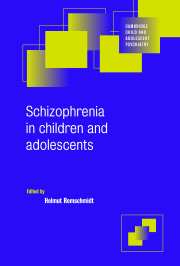Book contents
- Frontmatter
- Contents
- List of contributors
- Preface
- 1 Childhood psychosis and schizophrenia: a historical review
- 2 Definition and classification
- 3 Epidemiology of early onset schizophrenia
- 4 Childhood schizophrenia: developmental aspects
- 5 Diagnosis and differential diagnosis
- 6 Genetic aspects
- 7 Neurobehavioral perspective
- 8 Psychosocial factors: the social context of child and adolescent onset schizophrenia
- 9 Treatment and rehabilitation
- 10 Course and prognosis
- Index
10 - Course and prognosis
Published online by Cambridge University Press: 23 October 2009
- Frontmatter
- Contents
- List of contributors
- Preface
- 1 Childhood psychosis and schizophrenia: a historical review
- 2 Definition and classification
- 3 Epidemiology of early onset schizophrenia
- 4 Childhood schizophrenia: developmental aspects
- 5 Diagnosis and differential diagnosis
- 6 Genetic aspects
- 7 Neurobehavioral perspective
- 8 Psychosocial factors: the social context of child and adolescent onset schizophrenia
- 9 Treatment and rehabilitation
- 10 Course and prognosis
- Index
Summary
Introduction
This chapter is about course and outcome. Course is the pattern of illness over some length of time, while outcome refers to the end state at some distant point and may be short, medium or long term. While clearly there will may be some link between course and outcome, this is by no means always the case. For example, in theory, those who have a single psychotic episode may have a poor outcome while those that have many may do quite well. Some may have a slow deterioration and other a relatively rapid. Some may have many symptoms and some few. For this reason, course and outcome will be discussed separately. In the interests of clarity, premorbid state and onset have been separated out from course.
Overview
While exact figures are not known, it has been estimated that schizophrenia begins before the age of 10 in 3.5% of cases, with another 2.7% beginning between the ages of 10 and 15 (Asarnow, 1994), so that around 5–6% of cases may start before age 16.
While there are many studies of diverse aspects of schizophrenia, there are relatively few of child and adolescent schizophrenia and studies of longer term outcome in the younger age group are particularly scarce. For example, in the recent special issue of the Schizophrenia Bulletin (1994) on child and adolescent onset schizophrenia, only two studies systematically addressed longer-term outcome.
Knowledge about course and outcome in adults is more extensive, and has been summarized in a number of reviews (e.g., Westermeyer & Harrow, 1988; Marengo, 1994).
- Type
- Chapter
- Information
- Schizophrenia in Children and Adolescents , pp. 268 - 297Publisher: Cambridge University PressPrint publication year: 2000
- 1
- Cited by



